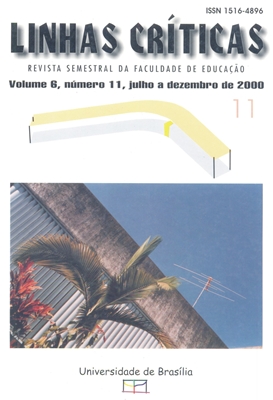Teorias organizacionais, imaginários e educação
DOI:
https://doi.org/10.26512/lc.v6i11.2862Palavras-chave:
Teorias Organizacionais;, Gestão escolar;, Imaginário;, OrganizaçõesResumo
As abordagens comumente utilizadas no estudo das organizações educativas pautam-se em modelos que propugnam a organização das escolas de forma semelhante hierarquizada na estrutura, uniforme e padronizada nos procedimentos, normas, papéis e funções em nome da racionalização dos processos, que visa à consecução das metas do produtivismo e enfatiza burocraticamente a organização. Com isso, um lado importante dessas orgauizações fica esquecido, pois, ao enfatizar o formal, o instituído, essa racionalização deixa de lado uma organizacionalidade instituinte a partir de significações imaginárias que perpassam, de forma oculta, não dita, a concretude da realidade evidenciada no cotidiano das referidas organizações. Portanto, tais estudos estão a exigir um repensamento e um redimensionamento, a fim de contemplar as múltiplas e diferentes dimensões contidas na realidade da escola na busca de novas pistas para sua análise.
Downloads
Downloads
Publicado
Como Citar
Edição
Seção
Licença
Copyright (c) 2016 Linhas Críticas

Este trabalho está licenciado sob uma licença Creative Commons Attribution 4.0 International License.
Autores que publicam nesta revista concordam com os seguintes termos:
- Autores mantém os direitos autorais e concedem à revista o direito de primeira publicação, sendo o trabalho simultaneamente licenciado sob a Creative Commons Attribution License, o que permite o compartilhamento do trabalho com reconhecimento da autoria do trabalho e publicação inicial nesta revista.
- Autores têm autorização para assumir contratos adicionais separadamente, para distribuição não-exclusiva da versão do trabalho publicada nesta revista (ex.: publicar em repositório institucional ou como capítulo de livro), com reconhecimento de autoria e publicação inicial nesta revista.
- Autores têm permissão e são estimulados a publicar e distribuir seu trabalho online (ex.: em repositórios institucionais ou na sua página pessoal) a qualquer ponto antes ou durante o processo editorial, já que isso pode gerar alterações produtivas, bem como aumentar o impacto e a citação do trabalho publicado.



